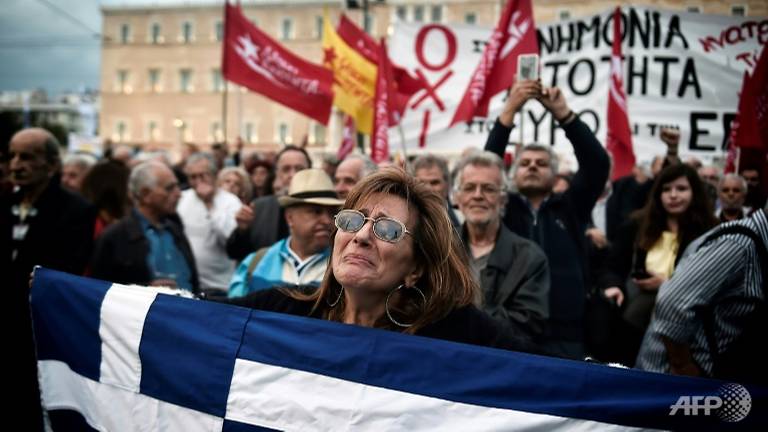IMF's Greek compromise could break impasse on aid deal
 |
| A demonstration outside the Greek parliament on May 18, 2017 amid voting on new austerity measures. The IMF has offered a plan to break the deadlock with European nations over debt relief/ (Photo: AFP/Louisa Gouliamaki) |
The International Monetary Fund is not bending its rules to help crisis-ridden Greece, but is helping to resolve an impasse over a new aid program, while continuing to insist on steps to reduce the country's massive debt burden, an IMF spokesman said on Thursday.
Coming just a week before a key Eurogroup meeting, the IMF has offered to revive a seldom-used option in its toolkit that allows the possibility of approving a new aid program for Greece, but without releasing any funds until certain conditions are met: in this case more specific commitments from Europe to bring the debt repayments to a manageable level.
Germany has resisted providing more debt relief, not least because it faces legislative elections in September, nor will it agree to a new loan for Athens unless the IMF also participates.
The impasse has lasted for months and now threatens to generate another crisis in Athens, which has a seven billion euro debt payment due in July.
The new interim step the IMF has offered could unlock the next instalment of the 86 billion euro aid package the euro zone approved for Greece in 2015. However, it also raises questions about whether the IMF is bowing to political pressure from Berlin.
"Our understanding is that the European partners could go ahead with a disbursement in this situation so it would avoid a destabilising situation in July," spokesman Gerry Rice told reporters of the compromise plan.
While the IMF is pushing to have an agreement at next week's Eurogroup meeting that includes an outline for more specific debt relief measures as the "first best solution," Rice said the compromise option would "help catalyse financing and debt relief."
"We're hoping there can be an agreement next week. We're making good progress, the differences are narrowing," he said.
However, even under the compromise option, he stressed, the IMF still would insist "on debt relief before releasing any of its funds. It is not in any way a backing down."
PLAYING WITH FIRE
With Greece's July debt repayment looming, European Commissioner for Economic Affairs Pierre Moscovici urged the euro zone officials to reach a deal and warned against any deadlock at next week's ministerial meeting.
"I really want to send a very clear message to the creditors of Greece: we must not play with fire," Moscovici said in Paris on Thursday. "We cannot afford to have a failure at the end of this Eurogroup."
The notion for the IMF compromise was first floated at the last meeting of Eurogroup finance ministers, and then offered publicly on Monday by IMF Managing Director Christine Lagarde.
It seemed a softening of the longstanding position of the IMF, which has insisted repeatedly that Greece's debt is not sustainable and the country would require significant debt relief from Europe before the fund could approve a new loan program.
But it is not a case "of breaching guidelines or bending or breaking rules. I would want to push back strongly against that notion," Rice said, noting that that would simply revive a tactic used in 19 cases previously, all in the 1980s, for countries like Argentina, Brazil, Mexico and Yugoslavia.
POLITICAL PRESSURE
But it would be the first time the IMF has ever used the procedure for an industrialised country, opening the fund up to criticism that it is bowing to political pressure and giving special consideration to a European country.
"That's all politics. Absolutely this is a double standard," Peter Doyle, a former EU executive at the Fund, told AFP. "This is treating Greece like no other countries."
And Thanos Catsambas, a former Greek representative to the fund, said the compromise "creates a big uncertainty."
But Desmond Lachman, another former senior official at the fund, said the deal was pragmatic. "I wouldn't regard it as a special treatment but it strikes me that it's a very imaginative solution," he said.
The situation is complicated by the fact Greece opposes the plan as a half-measure that would not reassure financial markets about the country's solvency.
"The IMF has been very pressing in its demand for austerity reforms, but when it has to ask for a settlement on the debt, it backs off or is wasting time," government spokesman Dimitris Tzanakopoulos said on Wednesday.
What the stars mean:
★ Poor ★ ★ Promising ★★★ Good ★★★★ Very good ★★★★★ Exceptional
Latest News
More News
- Russian President congratulates Vietnamese Party leader during phone talks (January 25, 2026 | 09:58)
- Worldwide congratulations underscore confidence in Vietnam’s 14th Party Congress (January 23, 2026 | 09:02)
- Political parties, organisations, int’l friends send congratulations to 14th National Party Congress (January 22, 2026 | 09:33)
- 14th National Party Congress: Japanese media highlight Vietnam’s growth targets (January 21, 2026 | 09:46)
- 14th National Party Congress: Driving force for Vietnam to continue renewal, innovation, breakthroughs (January 21, 2026 | 09:42)
- Vietnam remains spiritual support for progressive forces: Colombian party leader (January 21, 2026 | 08:00)
- Int'l media provides large coverage of 14th National Party Congress's first working day (January 20, 2026 | 09:09)
- Vietnamese firms win top honours at ASEAN Digital Awards (January 16, 2026 | 16:45)
- ASEAN Digital Ministers' Meeting opens in Hanoi (January 15, 2026 | 15:33)
- ASEAN economies move up the global chip value chain (December 09, 2025 | 13:32)
















 Mobile Version
Mobile Version